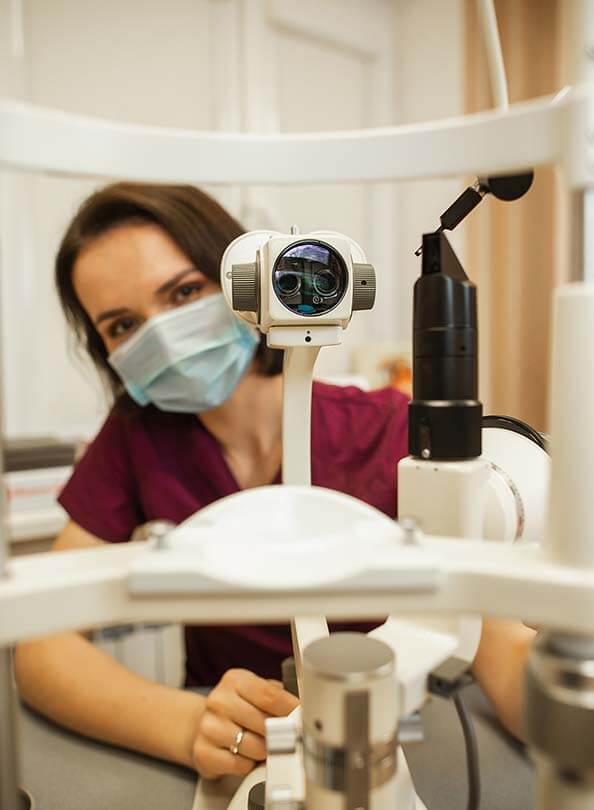Refer a Patient
iScope is currently accepting new patients. A referral from your primary care physician or specialist is required for consultations covered by your provincial plan. If you require rehabilitation services a referral is not required.
Vision therapy is a non-invasive therapeutic choice for those whose vision impairments cannot be remedied by eyeglasses or contact lenses alone. It involves some exercises and activities to improve visual abilities, such as eye movement control, eye teaming, and attention abilities.
Vision therapy is normally given by a qualified optometrist or ophthalmologist, and it is tailored to the requirements of each patient. The therapy may involve the use of a variety of visual aids, such as prisms, lenses, and filters, as well as specialized computer software and other tools.
Treatment options for vision problems include vision therapy, including amblyopia (lazy eye), strabismus (crossed eyes), and binocular vision impairments. Vision therapy may be helpful for people who have trouble learning, athletes who have vision problems related to their sport, and people who get eye strain and fatigue from spending too much time in front of screens.
Vision therapy has been shown to be a successful treatment for many patients, even though it is not a cure-all for all vision problems. Through routine vision therapy sessions and exercises carried out at home, patients can improve their visual abilities and skills, enhancing their overall visual function and quality of life.

Visual tools and approaches are used in vision therapy to assist patients in enhancing their mental health and general wellbeing. Three crucial facets of visual treatment are as follows:
The ability to learn and process information can be impacted by neurological conditions referred to as learning deficits. Visual therapy is a potential approach for helping those with learning disabilities. Visual treatment uses a number of visual tools and tactics to aid individuals with learning issues in enhancing their cognitive and academic abilities.
One of the key advantages of visual therapy for people with learning disabilities is the development of visual processing skills. Many persons with learning disabilities have difficulty processing visual information, which can impair their ability to read, write, and comprehend information. Visual therapy can improve a person’s visual processing skills, which will improve their understanding and memory of information.
Moreover, visual therapy may be a substantial assistance in the treatment of dyslexia, a common learning disorder that affects reading and writing skills. By using visual aids and strategies, people can improve their ability to decode and interpret written information.
Focus, attention, visual processing, and reading skills can all improve with visual therapy. It may be difficult for people with learning difficulties to focus their attention, which makes it difficult for them to complete tasks and maintain interest in educational activities. Visual therapy can help people become more attentive and focused by using visual aids and techniques that encourage engagement and concentration.
People with learning disabilities can improve their academic performance and overall quality of life with the use of visual therapy. By addressing visual processing issues and honing concentration and attention, people can access and interpret information more readily, boosting their effectiveness in academic and personal undertakings.
Optometrists are medical professionals with a specialty on eye and vision care. They are adept in identifying various visual defects in the eyes and advising corrective measures like glasses or contact lenses. Mississauga optometrists can give pre- and post-operative care for eye treatments, identify and treat eye conditions, and offer advice on preserving excellent eye health.
The following are the primary responsibilities and tasks of an optometrist:
Please don’t hesitate to inquire if you have any specific questions or want to know more about optometry.
Although they have different levels of training and expertise, ophthalmologists and optometrists both provide treatment for the eyes. Optometrists give basic eye care, diagnose common eye conditions, and write prescriptions for glasses and contact lenses. Ophthalmologists, on the other hand, are doctors who specialize in the care of the eyes and eyesight. They are capable of performing surgeries and managing difficult eye disorders.
Iscope Mississauga is located on the 5th floor of the Queensway Professional Centre building. You will find the Queensway Professional Centre directly across from Trillium Health Centre (former Mississauga Hospital).
Monday: 9:00am – 5:00pm
Tuesday: 9:00am – 5:00pm
Wednesday: 9:00am – 5:00pm
Thursday: 9:00am – 5:00pm
Friday: 9:00am – 5:00pm
iScope is currently accepting new patients. A referral from your primary care physician or specialist is required for consultations covered by your provincial plan. If you require rehabilitation services a referral is not required.
Suite 301 – 1111 Lonsdale Ave North Vancouver, BC V7M 2H4
P: 1-888-550-5508
F: 604-900-7676
Suite 200 – 8837 201 St Langley, BC V2Y 0C8
P: 1-888-550-5508
F: 604-900-7676
Suite 301 – 9639 137A St Surrey, BC V3V 0C6
P: 604-900-7007
F: 604-900-7676
Suite 500 – 89 Queensway West Mississauga, ON L5B 2V2
P: 1-888-550-5508
F: 416-900-7006
© Copyright 2023 Iscope Concussion and Pain Clinics. All Rights Reserved